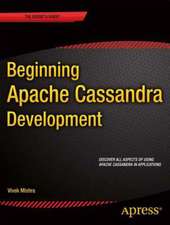Deadline Scheduling for Real-Time Systems: EDF and Related Algorithms: The Springer International Series in Engineering and Computer Science, cartea 460
Autor John A. Stankovic, Marco Spuri, Krithi Ramamritham, Giorgio C. Buttazzoen Limba Engleză Hardback – 31 oct 1998
Deadline Scheduling for Real-Time Systems: EDF and Related Algorithms aims at collecting a significant body of knowledge on EDF scheduling for real-time systems, but it does not try to be all-inclusive (the literature is too extensive). The book primarily presents the algorithms and associated analysis, but guidelines, rules, and implementation considerations are also discussed, especially for the more complicated situations where mathematical analysis is difficult.
In general, it is very difficult to codify and taxonomize scheduling knowledge because there are many performance metrics, task characteristics, and system configurations. Also, adding to the complexity is the fact that a variety of algorithms have been designed for different combinations of these considerations. In spite of the recent advances there are still gaps in the solution space and there is a need to integrate the available solutions. For example, a list of issues to consider includes:
- preemptive versus non-preemptive tasks,
- uni-processors versus multi-processors,
- using EDF at dispatch time versus EDF-based planning,
- precedence constraints among tasks,
- resource constraints,
- periodic versus aperiodic versus sporadic tasks,
- scheduling during overload,
- fault tolerance requirements, and
- providing guarantees and levels of guarantees (meeting quality of service requirements).
Deadline Scheduling for Real-Time Systems: EDF and Related Algorithms should be of interest to researchers, real-time system designers, and instructors and students, either as a focussed course on deadline-based scheduling for real-time systems, or, more likely, as part of a more general course on real-time computing. The book serves as an invaluable reference in this fast-moving field.
| Toate formatele și edițiile | Preț | Express |
|---|---|---|
| Paperback (1) | 986.84 lei 6-8 săpt. | |
| Springer Us – 22 mar 2013 | 986.84 lei 6-8 săpt. | |
| Hardback (1) | 991.27 lei 6-8 săpt. | |
| Springer Us – 31 oct 1998 | 991.27 lei 6-8 săpt. |
Din seria The Springer International Series in Engineering and Computer Science
- 24%
 Preț: 1041.98 lei
Preț: 1041.98 lei - 20%
 Preț: 643.50 lei
Preț: 643.50 lei - 18%
 Preț: 1225.62 lei
Preț: 1225.62 lei - 18%
 Preț: 965.02 lei
Preț: 965.02 lei - 20%
 Preț: 646.12 lei
Preț: 646.12 lei - 18%
 Preț: 948.79 lei
Preț: 948.79 lei - 20%
 Preț: 646.62 lei
Preț: 646.62 lei - 15%
 Preț: 637.46 lei
Preț: 637.46 lei - 20%
 Preț: 643.83 lei
Preț: 643.83 lei - 18%
 Preț: 949.23 lei
Preț: 949.23 lei - 20%
 Preț: 644.48 lei
Preț: 644.48 lei - 20%
 Preț: 994.92 lei
Preț: 994.92 lei - 20%
 Preț: 645.97 lei
Preț: 645.97 lei - 18%
 Preț: 946.87 lei
Preț: 946.87 lei - 20%
 Preț: 995.57 lei
Preț: 995.57 lei - 18%
 Preț: 956.99 lei
Preț: 956.99 lei - 20%
 Preț: 644.98 lei
Preț: 644.98 lei - 15%
 Preț: 649.54 lei
Preț: 649.54 lei - 18%
 Preț: 950.21 lei
Preț: 950.21 lei - 18%
 Preț: 1221.38 lei
Preț: 1221.38 lei - 18%
 Preț: 957.62 lei
Preț: 957.62 lei - 15%
 Preț: 643.99 lei
Preț: 643.99 lei - 18%
 Preț: 948.47 lei
Preț: 948.47 lei - 18%
 Preț: 947.35 lei
Preț: 947.35 lei - 20%
 Preț: 1284.65 lei
Preț: 1284.65 lei - 20%
 Preț: 1628.31 lei
Preț: 1628.31 lei - 20%
 Preț: 1285.78 lei
Preț: 1285.78 lei
Preț: 991.27 lei
Preț vechi: 1239.09 lei
-20% Nou
Puncte Express: 1487
Preț estimativ în valută:
189.70€ • 205.99$ • 159.35£
189.70€ • 205.99$ • 159.35£
Carte tipărită la comandă
Livrare economică 22 aprilie-06 mai
Preluare comenzi: 021 569.72.76
Specificații
ISBN-13: 9780792382690
ISBN-10: 0792382692
Pagini: 273
Ilustrații: XVI, 273 p.
Dimensiuni: 155 x 235 x 23 mm
Greutate: 0.54 kg
Ediția:1998
Editura: Springer Us
Colecția Springer
Seria The Springer International Series in Engineering and Computer Science
Locul publicării:New York, NY, United States
ISBN-10: 0792382692
Pagini: 273
Ilustrații: XVI, 273 p.
Dimensiuni: 155 x 235 x 23 mm
Greutate: 0.54 kg
Ediția:1998
Editura: Springer Us
Colecția Springer
Seria The Springer International Series in Engineering and Computer Science
Locul publicării:New York, NY, United States
Public țintă
ResearchCuprins
1 Introduction.- 1.1 Real-Time Systems.- 1.2 Common Misconceptions.- 1.3 A Typical Example of a Real-Time Application.- 1.4 Purpose of this Book.- 1.5 Format of the Book.- References.- 2 Terminology and Assumptions.- 2.1 Task Models, Assumptions and Notation.- 2.2 Static versus Dynamic Scheduling.- 2.3 Metrics.- References.- 3 Fundamentals of EDF Scheduling.- 3.1 Optimality on Uni-Processor Systems.- 3.2 Feasibility Analysis.- 3.3 Summary.- References.- 4 Response Times under EDF Scheduling.- 4.1 Finding Local Maxima.- 4.2 Deadline Busy Periods.- 4.3 Algorithm Description.- 4.4 Extended Task Modeling.- 4.5 Case Study.- 4.6 Summary.- References.- 5 Planning-Based Scheduling.- 5.1 Preliminaries: Load, Metrics, Value Functions.- 5.2 Steps in a Dynamic Planning-Based Scheduling Approach.- 5.3 Algorithms for Dynamic Planning.- 5.4 Timing of the Planning.- 5.5 Implementing Planning-Based Scheduling.- 5.6 Dispatching Jobs in a Planning-based Schedule.- 5.7 Summary.- References.- 6 EDF Scheduling for Shared Resources.- 6.1 The Nature of Resources and the Resulting Scheduling Problems.- 6.2 The Priority Inversion Problem.- 6.3 The Priority Inheritance Protocol.- 6.4 The Dynamic Priority Ceiling Protocol.- 6.5 The Stack Resource Policy.- 6.6 Resource Scheduling in Planning-based Schedulers.- 6.7 Summary.- References.- 7 Precedence Constraints and Shared Resources.- 7.1 Scheduling Dependent Tasks with EDF.- 7.2 The Notion of Quasi-Normality.- 7.3 Integration of Shared Resources and Precedence.- 7.4 Extended Task Model.- 7.5 Summary.- References.- 8 Aperiodic Task Scheduling.- 8.1 Dynamic Priority Exchange server.- 8.2 Dynamic Sporadic Server.- 8.3 Total Bandwidth Server.- 8.4 Earliest Deadline Late server.- 8.5 Improved Priority Exchange server.- 8.6 Performance Results.- 8.7 Summary.- References.- 9 Distributed Scheduling — Part I.- 9.1 Distributed Systems — An Overview.- 9.2 Holistic Scheduling Based on EDF.- 9.3 Performance.- 9.4 Summary.- References.- 10 Distributed Scheduling — Part II.- 10.1 The Spring Complex Task Set Allocation and Scheduling Algorithm.- 10.2 Focussed Addressing and Bidding.- 10.3 Summary.- References.- 11 Summary and Open Questions.- 11.1 Summary.- 11.2 Open Questions.- References.














